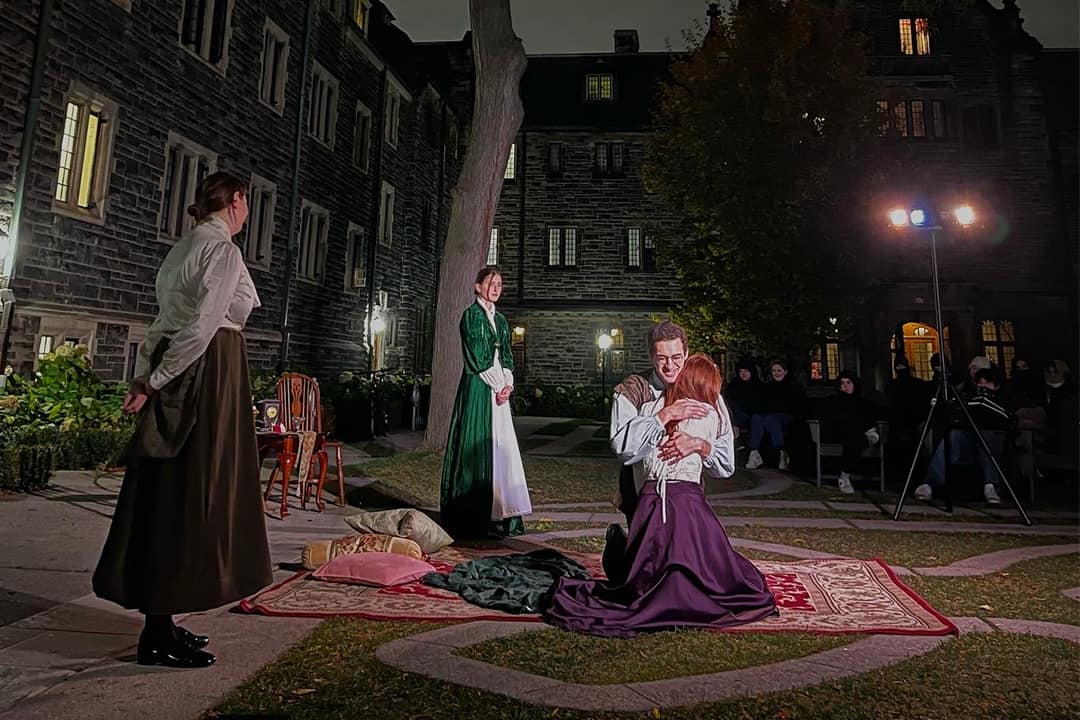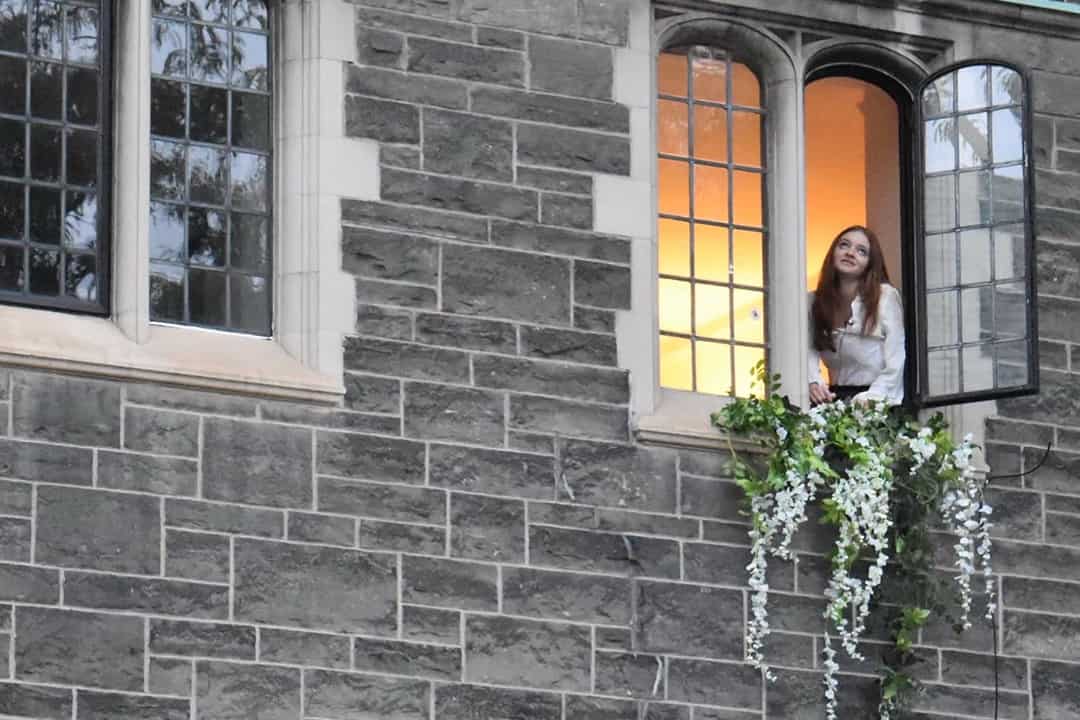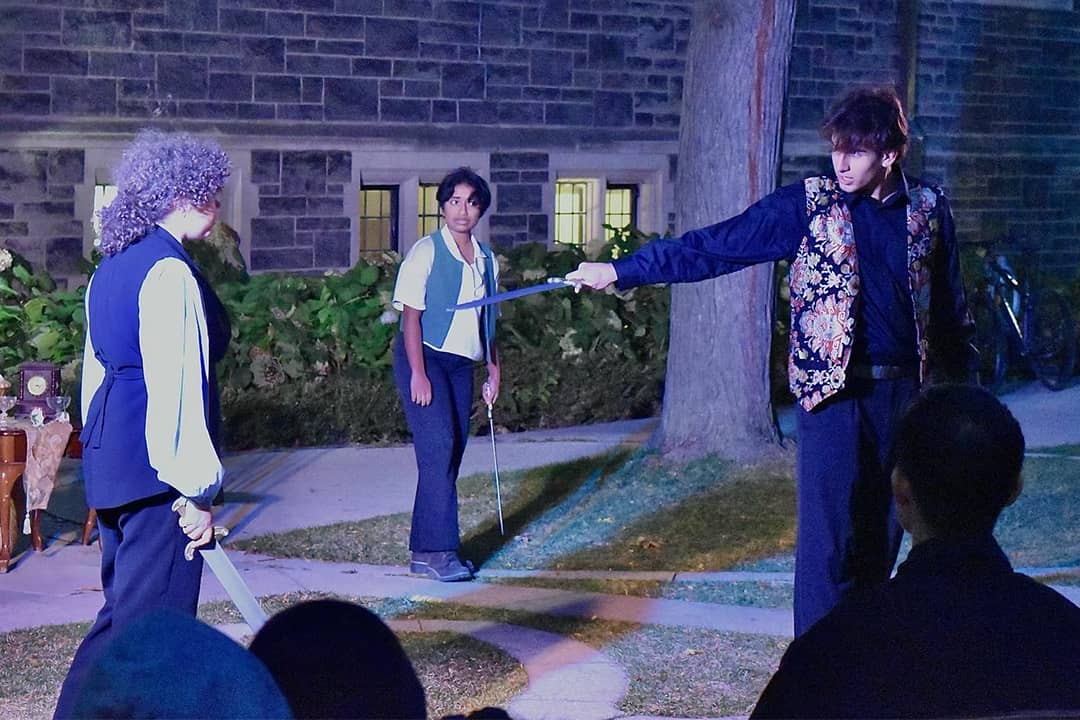Despite the biting cold in the Trinity College quad, spectators gathered on picnic benches and chairs, carrying blankets and extra jackets, to watch Romeo and Juliet on October 21. The Trinity College Dramatic Society (TCDS) organized the play, which ran for two nights, on October 20 and 21.
Shakespeare’s plays were originally performed in the Globe Theatre, with no roof and subject to the weather of Mother Nature, but the tradition of ‘Shakespeare in the Park’ — where Shakespeare’s plays are performed in public — has recorded roots from the ’50s in America. Joseph Papp founded the New York Shakespeare Festival, which gave performances of Shakespearean plays all around the city, including at outdoor locations like Central Park. Papp himself directed and organized most of the plays for years, with little to no pay, to establish the program.
At Trinity College, a theatre company led by Earle Grey — an actor, playwright, and director — ran annual Shakespearean productions in the quad from 1949–1958. The company would perform three or four plays in the summers and host a drama school to teach students production and theatre skills.
After some time without a Shakespearean play in the fall performance lineup, this year’s Romeo and Juliet was a revival of the company’s traditions.
“It’s supposed to happen every year, early on in the summer, to kick off the TCDS events. It’s open to the whole community,” Anneke Lee, the producer of Romeo and Juliet and president of TCDS, discussed the tradition of Shakespeare in the quad with The Varsity. “It’s either selected scenes from a Shakespeare play or as much of it as we can realistically do in the quad.”
TDCS tries to do alternating genres of plays — tragedies, romance, or dramas — but the one constant of creative and fun fight choreography is always there. This is the case in Macbeth or Hamlet, and even in a romantic tragedy like Romeo and Juliet where there are two dramatic sparring scenes.
Since the play is performed outside, without any of the traditional setup of a stage or seats, it is often minimalistic and casual. There were small tables with books, and performers brought on a blanket for the ending scene.
“We brought in some standing lights, we brought in speakers… and as far as the rehearsal process goes, a lot of it was just figuring out how much Shakspeare we can realistically do within a month timeframe,” Lee said. Using a window on the third floor of Trinity College for Juliet’s balcony scene and the arch to have actors enter and exit, the play embraced the quad.
Traditionally, the TCDS holds Shakespeare in the Quad the second week of September, but since a lot of students involved are international students, the TCDS opted to start its production in September and race against the cold. It was also Director Liz Sayers’ first time directing a play, having been an assistant stage manager in the past. The TCDS pulled this production together in about one and a half months, after the casting call on September 8.
Ulis Bertin, the actor who played Romeo, also discussed the crunched timeline. “It was a manic pace… so I’m very pleased that we were able to pull it off with as much accuracy and confidence as we eventually managed.” Complete with monologues, bantering debates, and a group opening, the two-and-a-half-hour run time was nothing to laugh at. “The best aspects of this production were its resourcefulness and dedication to getting things done,” Bertin said.
Lee also noted the cast’s dedication, even when rain on opening night forced them to move the performance inside to Cartwright Hall. “We were really able to step up, and people have such amazing, innovative ideas to make the space better.” Since they performed in Cartwright Hall the first night, Lee said, “We brought all of these beautiful fake flowers to the quad the second night, and we had more interesting ideas about what we could do with the lighting because we were forced to play with it in Cartwright Hall to make it work.”
Nature didn’t let the team off the hook the second night, either. On October 21, it was freezing. The cast and crew adapted again and improvised an intermission, letting everyone take refuge inside for 15 minutes.
From moving the set pieces to dealing with the weather, “the efficiency and time and resources [put into the play were] saved only by a surplus of enthusiasm from everyone participating,” Bertin said. Coordinating a 12-person cast alongside a crew is ambitious and no easy feat. The team’s effort came through in the end, resulting in two lovely shows and keeping up the Trinity Shakespeare in the Quad tradition.
TCDS hosted Twelve Angry Men on November 23–25, Grease is in the works, and it hosted a casting call for A Streetcar Named Desire in October. Since Romeo and Juliet is a tragedy and a romance, next year’s Shakespeare in the Quad is a coin toss. But as per tradition, we can look forward to swords.





No comments to display.